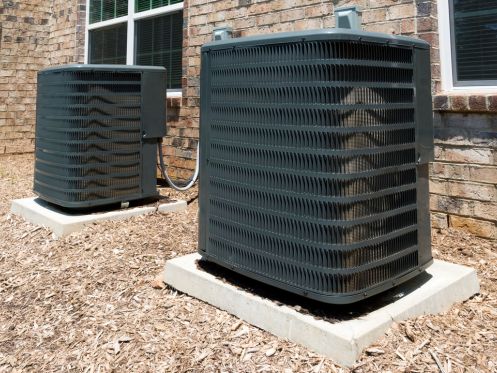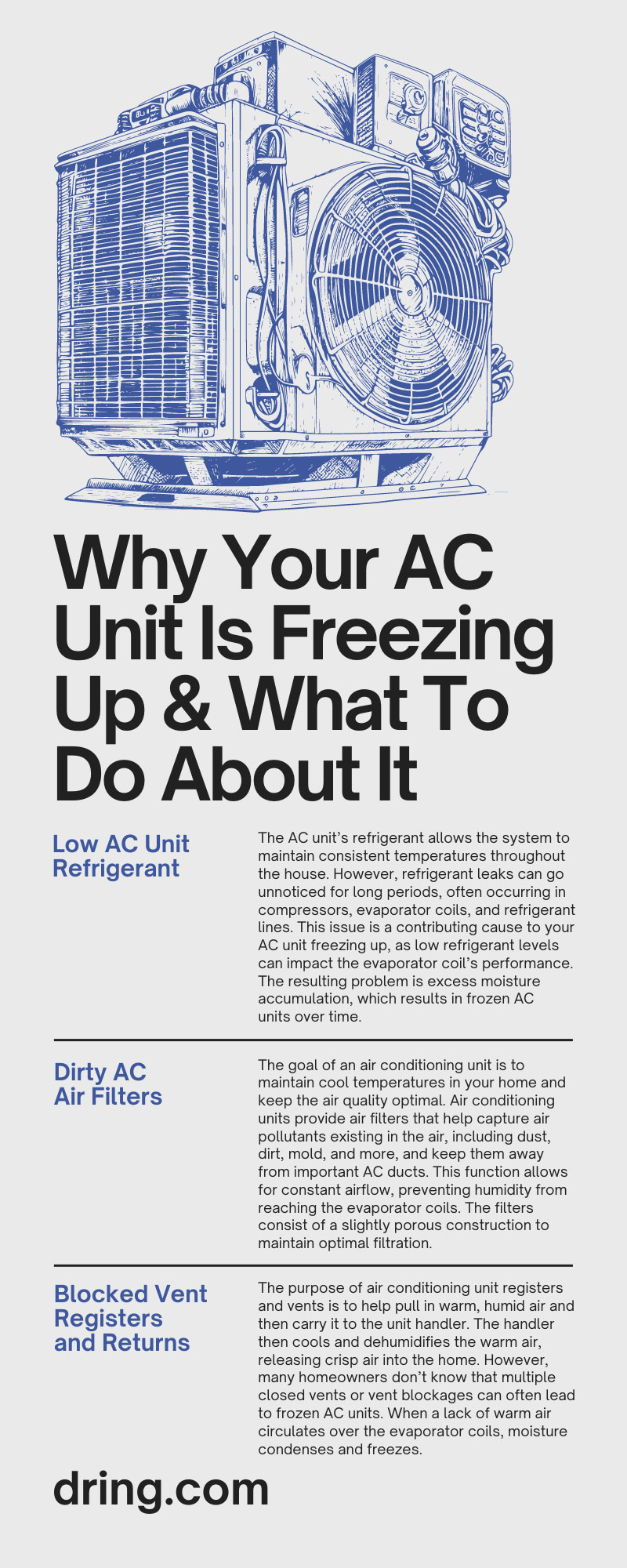Keeping your home cool is necessary, whether you experience warm weather during summertime or all year around. The last thing homeowners and tenants want is to try to relax at home while fighting away sweat. AC units can help maintain favorable temperatures, even on the hottest day.
However, your trusted air conditioning unit can suddenly begin showing signs of freezing problems. Due to ice formation on evaporator coils or damaged blowers, frost can build on the AC and turn it into a non-functional machine with hefty repair prices. Without a functioning air conditioning unit, you’ll have more difficulty keeping your property cool and reducing humidity. Learn about some of the reasons why your AC unit freezes up.
Identifying a Frozen AC Unit
An air conditioning unit can freeze up for a few different reasons. This issue can result from issues such as ice forming on evaporator coils or a frozen AC line. Usually, you can easily identify these issues with a quick visual check. However, it can become difficult to determine if your evaporator coils froze over. This problem often requires a professional to inspect your unit to make a diagnosis.
While there are many reasons why your AC unit freezes up, there are also several things you can do about it. Understanding and addressing various signs of a poorly performing air conditioning system can help you protect it from more expensive damages.
Low AC Unit Refrigerant
The AC unit’s refrigerant allows the system to maintain consistent temperatures throughout the house. However, refrigerant leaks can go unnoticed for long periods, often occurring in compressors, evaporator coils, and refrigerant lines. This issue is a contributing cause to your AC unit freezing up, as low refrigerant levels can impact the evaporator coil’s performance. The resulting problem is excess moisture accumulation, which results in frozen AC units over time.
As a result, delayed refrigerant restoration can result in severe system damage to the compressor. Furthermore, repairing or replacing faulty compressors can become an expensive ordeal. So, homeowners with older air conditioning units and damaged compressors are more likely to choose a new unit over hefty replacement part prices. You can find a leak by turning off your air conditioner and contacting an air conditioning and heating system professional to handle the inspection.
Dirty AC Air Filters
The goal of an air conditioning unit is to maintain cool temperatures in your home and keep the air quality optimal. Air conditioning units provide air filters that help capture air pollutants existing in the air, including dust, dirt, mold, and more, and keep them away from important AC ducts. This function allows for constant airflow, preventing humidity from reaching the evaporator coils. The filters consist of a slightly porous construction to maintain optimal filtration.
However, pollutant and debris buildup on an air filter surface can reduce airflow. This blockage can allow humidity and freezing to occur within the evaporator coils. It’s important to clean or change your AC unit’s air filters, which is an incredibly easy task. Start by turning your AC unit thermostat cooling off, then turn the fan on to blow warm air onto the coils to accelerate defrosting. Next, check the filter for quality. Homeowners should replace their air filters every three to four months, but it’s crucial to monitor them regularly in case of any changes.
Blocked Vent Registers and Returns
The purpose of air conditioning unit registers and vents is to help pull in warm, humid air and then carry it to the unit handler. The handler then cools and dehumidifies the warm air, releasing crisp air into the home. However, many homeowners don’t know that multiple closed vents or vent blockages can often lead to frozen AC units. When a lack of warm air circulates over the evaporator coils, moisture condenses and freezes.
Thankfully, the problem is easy to resolve—start by turning the thermostat off or switch it to the “fan” position to allow coils to thaw fully. You want to move any furniture and other potential obstructions away from returns. Lastly, do not shut more than two or three vents in your system.
AC Thermostat Levels
Many homeowners have air conditioning systems with predetermined temperature ranges. As a result, the systems cannot function if the outside temperature falls below 60 degrees Fahrenheit. This issue results in homeowners experiencing frequent freezing due to low evening temperatures creating pressure within the unit, which results in frost buildup.
You can try to resolve the issue by turning your AC unit off, letting it thaw, and not allowing your unit to run overnight. Furthermore, placing your thermostat at lower levels during heat waves will reduce the chances of functionality issues. If the problem persists, reach out to a professional technician.
Damaged AC Blower Fan
The blower fan in an air conditioning unit draws warm air into the ducts, circulating cool air throughout the house. Unfortunately, a blower fan can malfunction or become damaged from halted heat transferring. Excessive condensation can build up over the coils, especially if the blower fan isn’t working properly. Improper airflow can result in refrigerant lines and coils getting frozen over.
Blower fan replacement or repair is necessary if you experience difficulties starting your AC unit, severe reduction in externally blown warm air, or constant humming or whirring sounds. Contacting a trustworthy heating and cooling system technician can help determine the overall wear and age of the motor and blower fan. From there, they can determine whether repair or replacement is necessary.
Clogged, Dirty AC Coils
Your AC unit evaporator coils capture hot air inside your home and turn the heat into cooled air, making the space more comfortable. The evaporator is a primary AC unit component within the heat exchange system. However, damp coils can easily catch debris and dust, restricting airflow.
To resolve this issue, you want to start by turning the AC unit off to stop further damage. You must enlist the help of a professional heating and cooling system technician to clean off the coils. Afterward, your air conditioning unit should work like normal.
AC Air Duct Problems
Air conditioning ducts are helpful passageways to remove and deliver air from the system. It’s common for obstructions and leaks to impede airflow consistency, resulting in preventing warm air from reaching the evaporator coils. As a result, the coils freeze over and don’t work properly.
Determining your air duct issues is important, so inspect for dust or obstructions, such as furniture and curtains near vents. Furthermore, practice proper AC unit maintenance to prevent air duct issues. If the problem is out of your hands, contact a technician to inspect the airflow.
Dring offers homeowners exceptional heating and cooling system repairs in the Carrollton area. Our AC services in Frisco range from residential air conditioning and heating repair to checking indoor air quality and duct cleaning. Ask about our services today.








